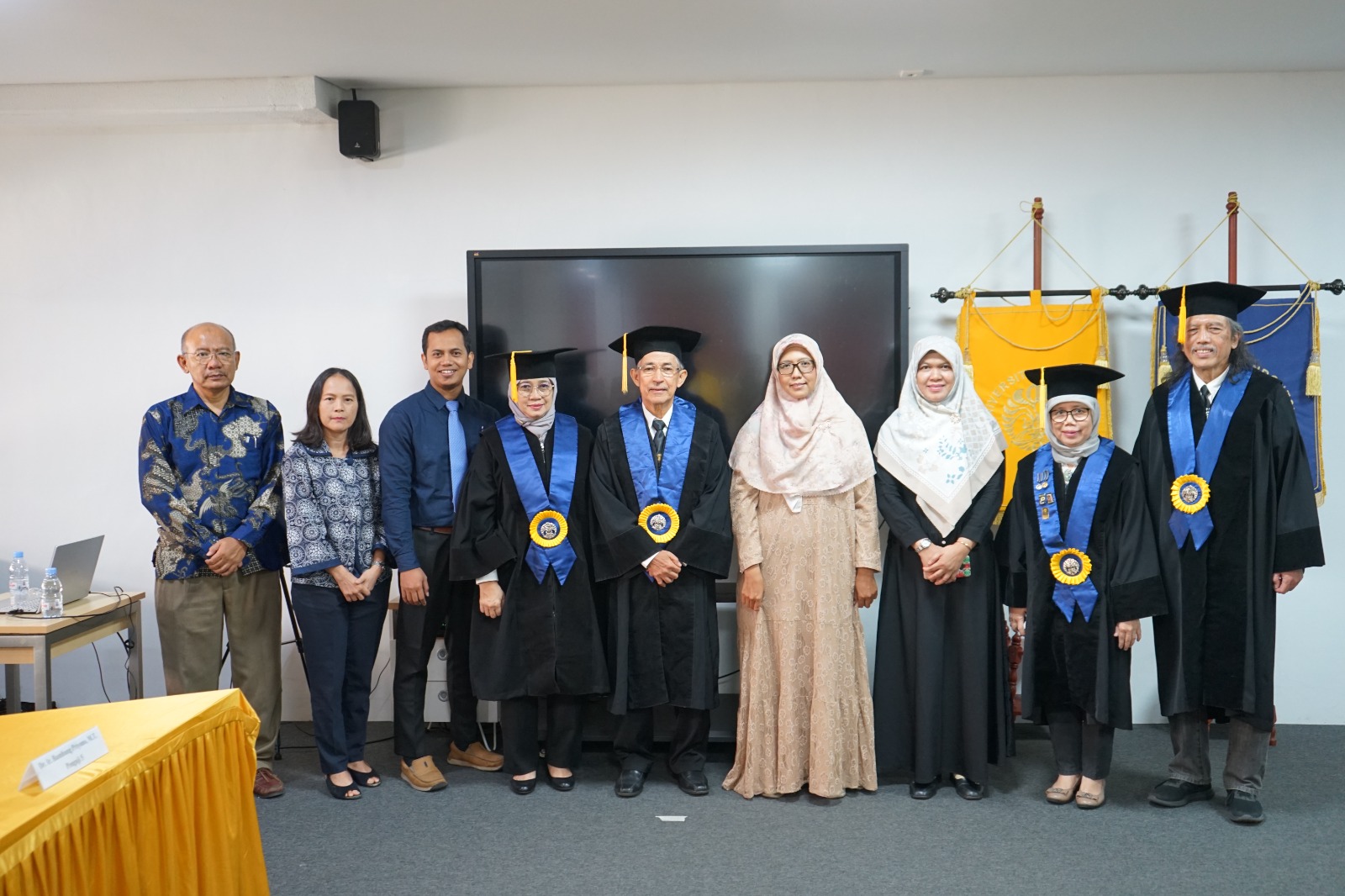In recent years, the rapid improvement of technology has driven the development of various types of materials in the fields of science and research. One of the most popular materials for research is reduced Graphene Oxide (rGO). Materials are made from Graphene Oxide (GO) by carrying out various chemical and thermal processing methods to reduce the oxygen content in them. The outstanding properties of rGO, such as thermal, mechanical, and electronic properties, make it a potential candidate material for use in a wide range of applications, with the addition of matrices to widen its uses.
Realising this potential, Nurhayati Indah Ciptasari raised this topic in her research dissertation entitled Development of Reduced Graphene Oxide Nanocomposite Materials for Photocatalyst and Supercapacitor Applications. In this effort, Indah carried out a series of stages involving the process of synthesis and characterization of materials to understand their physical and chemical properties.
“The initial stage of this research involved preparing reduced graphene oxide raw material from graphite using a modified Hummers method. Chemical and thermal processing processes are carried out to reduce the oxygen content in Graphene Oxide and produce rGO, which has unique and interesting properties,” said Indah.
Furthermore, Indah explained the process of synthesising rGO nanocomposites with AgNPs (Silver Nanoparticles) through the in-situ hydrothermal method using NaBH as a reducing agent. This process aims to expand the use of nanocomposite materials in more effective photocatalytic applications. In testing its photocatalytic activity against Pb ions, Indah was able to evaluate the photocatalytic effectiveness of rGO/AgNPs and their potential use in waste treatment.
Using the same method, Indah also synthesised rGO nanocomposites with ZrO2 (Zircon Dioxide). From the results of the synthesis, physical and chemical characterization was then made using various analytical techniques such as X-Ray Diffraction (XRD), Scanning Electron Microscope (SEM), Raman Spectroscopy, UV-Vis Spectrophotometer, Fourier Transform Infra-Red (FTIR), and Electrochemical Impedance. Spectroscopy (EIS).
The results of this study indicate that the synthesis of rGO/AgNPs nanocomposites using the in-situ hydrothermal method with the reducing agent NaBH has been successfully carried out. In testing its photocatalytic activity against Pb ions, this nanocomposite was able to reach a maximum percentage of 44% in 1.5 hours of irradiation. These results indicate the potential of the rGO/AgNPs nanocomposite as an effective photocatalytic material in the treatment of waste containing Pb ions.
In addition, Indah also succeeded in synthesizing rGO/ZrO nanocomposites using the in-situ hydrothermal method with NaBH as a reducing agent. In material characterization, it was found that nanocomposites with a GO-ZrO ratio of 1:2 and using PANI (Polyaniline) in H2SO4 electrolyte solution showed the highest specific capacitance value of 482 F/g. This is because under these conditions, the nanocomposites are capable of producing high conductivity, which is a key factor in supercapacitor applications.
Prof. Dr. Heri Hermansyah, S.T., M.Eng., IPU, Dean of the Faculty of Engineering UI (FTUI), said, “These findings provide important information regarding the potential application of rGO/AgNPs nanocomposites in photocatalysis and rGO/ZrO nanocomposites in supercapacitor technology. With these positive results, Indah’s research can make a significant contribution to the development of reduced Graphene Oxide (rGO)-based nanocomposite materials for various innovative applications in the future.”
A research dissertation on the development of rGO nanocomposites succeeded in bringing Nurhayati Indah Ciptasari to a doctorate degree on July 11, 2023. Indah was recorded as the 64th doctoral graduate of the Department of Metallurgy and Materials Engineering and the 508th doctorate from the Faculty of Engineering at the University of Indonesia. The open session was chaired by Prof. Dr. Ir. Muhammad Anis, M. Met., with promoter Prof. Dr. Ir. Johny Wahyuadi Soedarsono, DEA, and co-promoter Prof. Dr. Anne Zulfia, M.Sc. While the testing team consisted of Dr. Murni Handayani, M.Sc.; Prof. Dr. Rini Riastuti, M.Sc.; Dr. Alfian Ferdiansyah; Dr. Sotya Astutiningsih, M.Eng.; and Dr. Bambang Priyono, M.T.
***
Bureau of Public Communications
Faculty of Engineering, University of Indonesia

